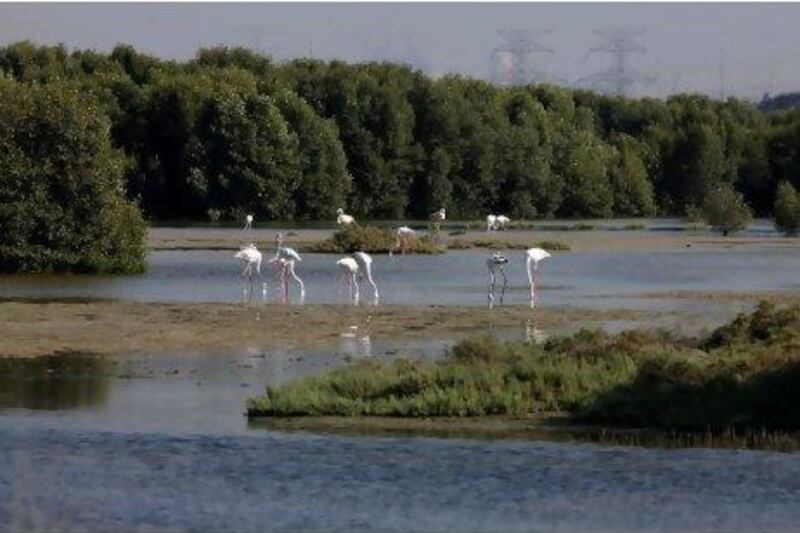ABU DHABI // The UAE must give protected status to wetlands and provide carefully planned public access to them to preserve the nation's waterbirds, experts say.
The warning came after an announcement on Tuesday that four of the country's six most important wetlands were facing pressure from coastal development.
Video:Tracking Flamingos in Abu Dhabi
The Environment Agency - Abu Dhabi captured and tracked its 15th Flamingo as part of ongoing conservation efforts.
The Environment Agency - Abu Dhabi (Ead) released the report after the national annual waterbirds census was carried out by 23 experts from government and non-government organisations in mid-January.
As The National reported yesterday, the four most threatened important waterbird areas were: Bul Sayeef in Abu Dhabi; Ras al Khor in Dubai; Khor al Beidah in Umm al Qaiwain; and Khor al Khawair in Ras al Khaimah.
"These important sites have already suffered irreversible loss of habitats and need to be included within protected areas," said Dr Salim Javed, the manager of biodiversity assessment and monitoring at Ead and the national co-ordinator for the census.
The main problems are development such as dredging, reclamation and other industrial and urban activities that can harm bird habitats, Dr Javed said.
"Breeding birds in particular, such as the greater flamingo and the western reef heron, are most likely to be affected by development," he said.
Kevin Highland, an expert at the Wildlife Protection Office in Dubai, said one way to ensure protected wetlands remained intact was to build visitor centres.
"The only way that protected areas can remain protected is to share them with the public and make sure they have high exposure without damaging them," Mr Highland said. "People will get to know what goes on in wetlands and why we need to protect them."
He said a good example was the London Wetland Centre, a 42-hectare site close to the heart of the English capital.
"A good visitor centre does not have to cost a fortune but it needs to be designed by people who understand wildlife," Mr Highland said. "It requires specialist knowledge of people who know how to protect and display wildlife."
Ras al Khor and Bul Sayeef are already formally protected but that was not enough to keep either of them intact.
Until the onset of the global financial crisis, areas near the Dubai wetland were set aside for large-scale property projects.
One was The Lagoons, a project that envisioned several islands with residential, commercial and leisure facilities, and high-rise buildings.
Another development, the Meydan City Canal, would have gone right through the protected wetland.
But with the lull in construction, the area's feathered inhabitants have remained relatively undisturbed and the census this winter recorded the highest number of greater flamingos - more than 3,000 - of any of the 47 sites studied.
In Abu Dhabi, the Bul Sayeef Marine Protected Area is particularly important for wintering birds, which use it to rest and feed while migrating from Europe to Africa.
In June 2008, construction started on a new navigation channel that bisected the area. About a year after, scientists discovered the area was also home to a colony of flamingos, with 18,000 birds counted at the time.
The Dh1.5 billion channel was opened in February this year. It is 200 metres wide, nine metres deep at low tide, and stretches about 53km, connecting the Musaffah Industrial Area to the Arabian Sea.
Khor al Beidah and Khor al Khawair lack protected status, and are under threat from encroaching urban development.
Dr Christophe Tourenq, the science and research manager at the Emirates Wildlife Society-World Wide Fund for Nature, said it was important for people and officials to recognise the country's wetlands are a network.
Dr Tourenq said the UAE had the world's third-largest population of the crab plover, a wading bird. While crab plovers breed mainly on islands off the coast of Abu Dhabi, Khor al Beidah and Khor al Khawair are important wintering sites for them.
"What people need to understand is that all wetlands in the UAE are connected," he said. "They all have a function at a different stage of the life of birds. If one disappears, an important piece of the puzzle is gone."
Apart from the four threatened sites, Al Wathba in Abu Dhabi and Khor Kalba in Fujairah are the country's most important areas for birds.
The wetlands are also vital nursing grounds for many fish species, including some of commercial importance, Dr Tourenq said.
The annual waterbirds census counted nearly 95,000 birds. It is part of a global initiative overseen by Wetlands International, a conservation organisation based in the Netherlands.





